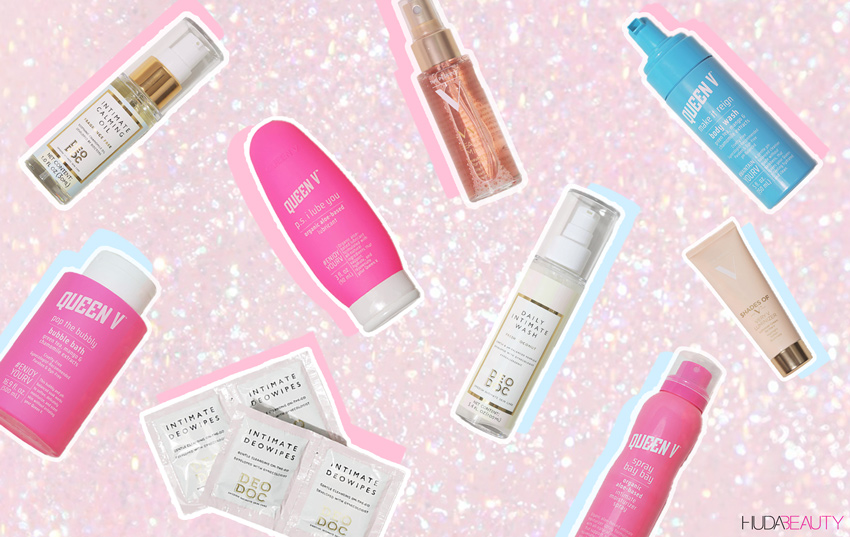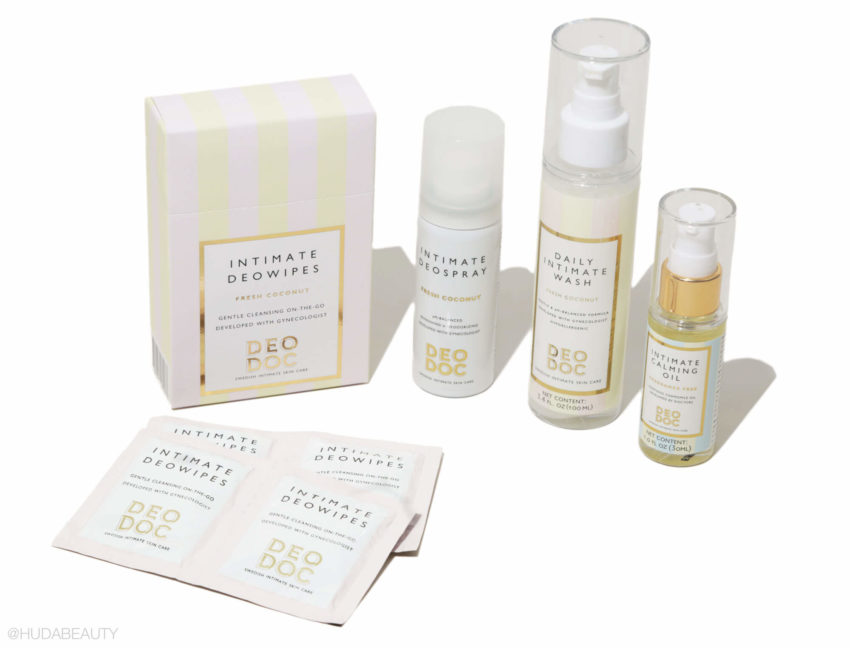The Debate On Feminine Hygiene Products: Do You Really Need Them?

2019 is the year of self-care, and for a lot of us, that means exploring new regions to indulge your love of beauty products… Including down there. The beauty world majorly appreciates that and it’s currently going wild for feminine hygiene products. There’s everything from calming ointments and exfoliators to cleansing wipes and deo! But since your vagina is the OG independent lady, aka it’s a self-cleaning system, we’re left wondering how much of it do you really need? Because let’s be real, we’ve done pretty well without them for a long time now. And does the very concept of feminine hygiene put pressure on us to actually use targeted feminine products?
We spoke to two OBYGNs for the lowdown; Dr. Rebecca Booth M.D. Gynecologist & Co-Founder VENeffect, and professor at the Yale University School of Medicine, Dr. Mary Jane Minkin. Now, you can make an informed decision whether to back the trend or give it a miss; because at the end of the day, it’s your body, so it’s your choice.
Understanding your vagina…
Before we get into the “should we, shouldn’t we” debate, the first step is to understand your vagina. Dr. Booth explains, “The vagina’s health is protected by its own environment and microbiome — a community of beneficial organisms that maintain the self-cleaning system that’s remarkable and unique in the body. The secret to a healthy vagina is eating a good organic diet, drinking plenty of water, avoiding antibiotics if possible, eating probiotic foods, as well as sometimes taking certain probiotic supplements (acid-loving bacteria such as a variety of acidophilus cultures) and avoiding unnecessary toxins such as cigarette smoke. As we age, and the biologic clock winds down, during perimenopause and menopause, women often experience increased dryness and loss of elasticity.”
Anatomy of the Vulva:
Aka the external part of the female genitalia (not vagina)

Are feminine hygiene products expert-approved?
“I feel there’s an opportunity for feminine products to optimize our unique feminine physiology. Optimizing vaginal lubrication with oil-free, antibiotic-free, fragrance-free and pH balanced products is another much-needed frontier for women.” Dr. Booth says.
Posts You'll Love:
But do you really need to use feminine hygiene products?
“The external vulvar skin is very similar to the underarm skin in that both areas are designed to be protected by hair that matures early in puberty; both areas are prone to blocked pores, hair follicle irritation, perspiration, and rashes. The vulvar skin is also sensitive and prone to hormonal variation, which can lead to irritation and clogged pores.” This is why Dr. Booth believes that it’s preferable to cleanse and even gently exfoliate the vulva: “Gently using an exfoliation glove with a fragrance-free pH-appropriate soap or cleanser will help lessen clogged pores and reduce hair follicle bumps and help keep the skin fresh and healthy in this area.”
 via Giphy
via Giphy
However, with regards to a vulvar moisturizer; Dr. Booth says “Because the vulva does not ordinarily have sun damage or wind damage the area generally does not need extra moisturization before menopause, but with the advent of extreme shaving and hair removal processes the skin can become dry and exposed. A gentle fragrance-free moisturizer may protect and hydrate the skin. After menopause (the ovarian retirement plan) kicks in many women may notice a decrease in vulvar skin elasticity as well as dryness and a loss of volume. Products designed to add back an estrogen-effect are particularly helpful with this challenge and can increase hydration and collagen content.” Dr. Minkin agrees; “Moisture is certainly fine. Particularly postmenopausal women and breastfeeding women who are at risk for a low estrogen environment, which makes the vulva dry, so moisture is good. ”
Ultimately, feminine hygiene products are not essential, but as long as they’re clinically-tested and fit the below criteria, then use them if you want to. We’ll be honest, we totally thought vulvar skincare was a trend, but since we’ve been testing them out (check out our reviews below) we’ve actually been really enjoying this extra step in our self-care routine.
What to look for in feminine hygiene products:
Fragrance-free: “Skin products used above the vulvar area should preferably be fragrance-free and work in concert with the skin’s physiology… Not competing with the normal physiology of the skin.” Dr. Booth tells us.
Gentle products: “You only want products which are relatively hypoallergenic as this area has delicate skin.” Dr. Minkin says.
 via Giphy
via Giphy
What to avoid in feminine hygiene products:
Talc: “Avoid powders such as talc or cornstarch. Use natural fibers instead of synthetic for clothing that comes into contact with the vulvar area,” Dr. Booth warns. Think cotton gussets in your underwear, instead of polyester.
Shaving: “Minimize (or avoid) shaving to care for delicate vulvar skin.” If your preferred hair removal method is shaving, make sure you read our guide for all our tips on how to minimize shaving rash.
Vagina steaming…
Although vaginal steaming has been getting a lot of air time recently on Instagram, both Dr. Minkin and Dr. Booth warn against this ‘wellness’ trend. Dr. Minkin said “You never want to steam the vagina as the vagina has its own good normal flora (“good guy bacteria”) and you could burn the vagina (delicate tissue).” While Dr. Booth says “There’s no known medical benefit to vaginal steaming and such treatments could theoretically be harmful by causing skin burns or encouraging unhealthy organisms advancing with steam to enter the abdomen through the cervix.”
Tried & Tested Feminine Hygiene Brands:
The Perfect V

The Perfect V was founded by Avonda Nelson Urben to provide a luxe range of products to pamper your “V.” By V, they are referring to your ‘Mons Pubis’ aka the region above the vulva that The Perfect V describes as, “That small triangle we wax, shave, laser, sugar, trim.” Avonda quite rightly pointed out that despite it being a super sensitive area, it’s often subject to aggressive treatments like epilating or shaving.
We showed our VJJs some love using the Very V Lumininzer, $43, which contains sea buckthorn and Vitamin E fruit; both of which are full of antioxidants to brighten and hydrate the skin. We also tried out the Gentle Exfoliator, $40, which is great if you’re prone to ingrown hairs as it contains the chemical exfoliant salicylic acid. However, this also means you should only use it two to three time a week.
Check our The Perfect V here.
DeoDoc

DeoDoc was founded by sisters Dr. Hedieh Asadi and Hasti Asadi who were sick and tired of the age-old myths and awkward stereotypes of feminine hygiene. Their medically-backed vagina-lovin’ products are made by women for women, developed and tested by gynecologist and doctors. We really like the Intimate Calming Oil, $33, a blend of oils that help calm and soothe the vulva when you have redness or irritation (true story: we were not feeling this on first impressions, but now we’re kinda obsessed). We really enjoyed using the Daily Intimate Wash, $26, as it’s super gentle, smells great, and helps to balance the pH levels of your VJJ.
Check out DeoDoc here.
Queen V

Queen V is a super fun, affordable female hygiene brand, that’s just as cute as it is effective. The brand is upfront too; there’s no shame in their game; the products are pH-balanced, derm and gyno recommended, made by women for women. We’re currently obsessed with the Pop The Bubbly bubble bath, $9, which is infused with green tea, mango and chamomile extract; it’s perfect for when you have cramps as the chamomile will work as an anti-inflammatory, and it smells amazing. Even if you don’t buy their products; make sure you follow their IG; it’s funny, honest, and educational.
Check out Queen V here.




















Leave a comment